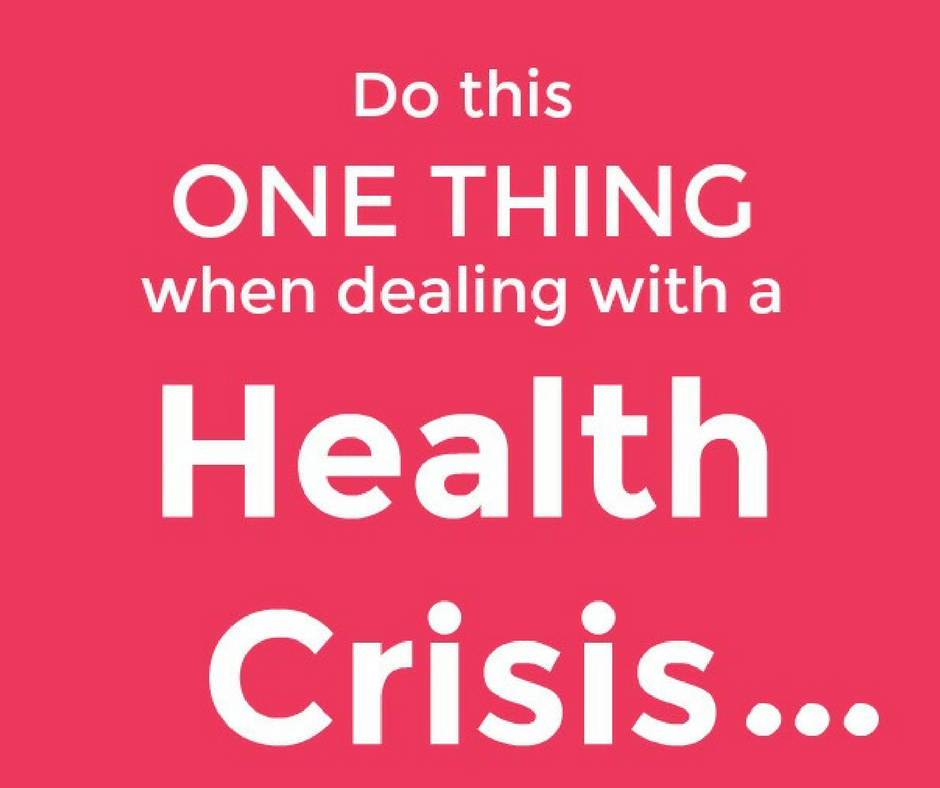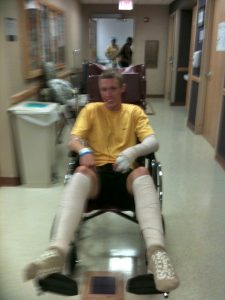One Tip On Dealing with a Chronic Disease or Health Crisis
 My daughter was 16 when a serious flare-up of her asthma became life-threatening and landed her in the hospital for several days.
My daughter was 16 when a serious flare-up of her asthma became life-threatening and landed her in the hospital for several days.
What I didn’t realize then is that incident would start a yearlong battle full of twists and turns to help her regain her health. I learned many things during that time, but today I want to share one tip that can make a huge difference if you find yourself in the middle of a health crisis or chronic illness. It’s a simple thing to do, but it can give you an advantage as you wage your fight:
Start a health notebook.
As I said, it’s a simple thing, but creating a notebook will save you so much time and headaches and maybe even a few missteps along the way. Here is how I did it. Tweak it to work for you.
- Get a three-ring binder and purchase some tabbed dividers. Fill the notebook with paper and create sections according to your needs. My suggestions: Symptoms, Medications, Doctor visits, Insurance, Nutrition/Diet, Supplements, Research, Resources, School
- Put the person’s name in the notebook along with their birthdate. Sometimes a family member who may not know birthdates will be in charge, so put in the birthday and year.
- Create a medication list of all the meds the family member is on. Be sure to list the medication name, dosage, how many times a day they take it, and the date they started it. Print the list out and put it in the notebook. Update it every time it changes.
- List any vitamins, herbs, essential oils, tinctures, etc. the person is taking. This is important for contraindications for meds.
- List any medication allergies in the same section.
- In the doctor section, put a printout of every doctor name, telephone and fax number, and address.
- Make a few copies of your insurance card and put them in the Insurance section.
How To Use a Health Notebook
This notebook will be a huge help during this stressful phase of your life. Let’s look at a few ways you can use it.
- Every time you go to a doctor appointment, take the notebook with you. Start a new page, put the date of the appointment, who the doctor is and what was said/decided at the appointment. It is too easy to forget things especially if you’re tired, stressed, or otherwise distracted. Don’t assume that all your doctors are communicating with each other. Hopefully they are, but make sure you update them as to any changes another doctor made in treatment/meds.
- Between appointments keep track of symptoms/episodes and write them down along with the date and time in the Symptoms section. This can help you detect any patterns.
- Keep track of any ongoing insurance phone calls/claims/information in that section. Write down the date, who you talked to, and what was said. It’s so much easier to prove what happened when you take careful notes and you’re not hunting around for the scrap of paper you wrote it on.
- Is the person trying a special diet, such as an elimination diet or gluten-free diet, etc.? Keep a copy of it in the notebook, along with the date it was started and any progress.
- In the research section, you may want to include any information you have found that you want to show to your doctors. It’s easier to keep a master digital file, but having a printout of that new study you want to discuss with your doctor is helpful when you’re out and about. And this brings up a good point. Be your own best health advocate and research on your own. You have one patient you’re in charge of. Your doctor has many.
- Google the condition/disease, research alternative treatments, and pay attention. Being informed is important, and you may find something that will help. For example, when my son was in the hospital suffering from burns, through my research I discovered that protein was
critical in helping his skin to heal. Every day my daughter and I made/bought protein-rich smoothies for him. He healed more quickly than any of us expected. I don’t know if it was the shakes, but it certainly didn’t hurt him. It’s a good idea to let the nurse/doctor know what you’re doing to make sure it won’t cause any problems.
- Google the condition/disease, research alternative treatments, and pay attention. Being informed is important, and you may find something that will help. For example, when my son was in the hospital suffering from burns, through my research I discovered that protein was
- As you find helpful resources, create a list so you’re able to find them again. For example, write down the name of that new product you want to try and how to get it/how much it costs. Write down the name of the specialist your neighbor told you about.
- If the person is in school, keep track of assignments, notifications to the school, anything the school needs to do/be aware of, and so on.
These are just a few suggestions. I’m sure you’ll think of many more. I’ve created and used these health notebooks four times in my life, and each time they made a difficult season of life much easier to navigate. I hope they do for you too. I’m praying for you! Let me know your thoughts on how to use it.
Botanically yours,


